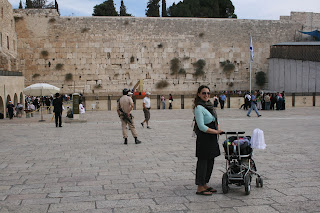A friend of mine recently started a Facebook group called Peaceful Women, aimed at encouraging women from a cross-section of ethnic-religious backgrounds to exchange ideas, thoughts and information and to begin to forge friendships. The idea behind this is that as women are thought to be the gentler sex, that a women-only forum would be a good place to begin to forge peace connections.
It is interesting that women (myself included) have happily joined, without questioning the women-only nature of the group. It is particularly interesting as it comes at a time when gender politics has reared its head in Israel in the context of the Haredi gender segregation that is creeping ever more into the public sphere.
There have been, on my count, three examples of gender segregation encroaching further into public space in Israel in recent weeks. Firstly, the news that in Mea Shearim, the street itself was to have a mechitza (separation barrier) erected to allow men and women to pass freely but separately in the streets during Sukkot. I was unsure how I felt about this. After all, it was taking place within a strictly ultra-orthodox community, where, as far as I am aware, the only reason for a non-ultra-orthodox person to be there is to gawp at the curiosities of this insular community.
Then, within a few weeks of this news story, I heard about the increasing practice of defacing advertisements in Jerusalem that featured women. This vandalism has led some advertising agencies and their clients towards self-censorship - cropping women out of photos (Honnigman) or excluding them altogether (the campaign for organ donors), but also to an increasingly loud female voice condemning this development. Jerusalem's Mayor Nir Barakat has condemned the vandalism and encouraged the police to deal with incidents that arise, whilst also firing Rachel Azaria, a Jerusalem councilwoman who had appealed to the Supreme Court against the Mea Shearim barrier. This strangely contradictory behaviour looked to all and sundry as Barakat capitulating to ultra-orthodox pressure (see article). They are, after all an increasing proportion of the population, and in Jerusalem they are a significant constituency in municipal elections.
The most recent, and highly publicised example of gender segregation 'crossing the line' is the ongoing bus saga. There have been a number of reports of women being pressured into sitting at the back of public buses that serve ultra-orthodox areas. The gender segregation on certain lines is not news, in the sense that it is not new, but in the current climate in which gender segregation has spread beyond the buses, it has become newsworthy. Tanya Rosenblit's experience has been widely read online and even the Daily Mail here in the UK has joined in, stating that "Ultra-Orthodox Jews, who make up about 10 percent of Israel's population of 7.6 million, have become increasingly aggressive in their efforts to impose their norms in public spaces."
Indeed, the bus issue has become a key issue, even Bibi has stated that "Fringe groups must not be allowed to tear apart our common denominator. We must preserve public space as open and free for all citizens of Israel." (longer article here)
It seems that even within the ultra-orthodox community, opinion is divided as to whether such gender separation needs to be enforced. I've read a number of talkbacks where representatives of the 'silent majority' defend ultra-orthodoxy in general. I'm also aware that within the ultra-orthodox community it is often the strictest interpretation that goes unchallenged. However, this issue will not go away and divisions between the ultra-orthodox, religious and secular Israelis are only going to widen if the 'silent majority' remains silent.
I don't have a solution. Perhaps the private bus line suggested by a group of ultra-orthodox millionaires is the answer (full article), although this would still be considered 'public space'. However, isn't a synagogue also public space? No-one questions the separation of men and women there. I hope a live and let live solution can be found where neither the secular or religious impose their rules on each other. However, I must include the caveat that religious women (those within the silent majority perhaps?) themselves shouldn't feel coerced or forced into behaviour with which they disagree or which makes them feel isolated.
 |
| er... hang on... isn't THIS gender segregation in a public place??? |
Goodness, that's a long post. I am now going to watch the rather excellent Simon Sebag-Montifiore's programme on the history of Jerusalem on BBC4. There's been some excellent programming on the BBC about Jerusalem recently. In addition to this history series, I very much enjoyed Yotam Ottolenghi's 'Jerusalem on a Plate' - next time I will post some positive, happy news about that special city.

















